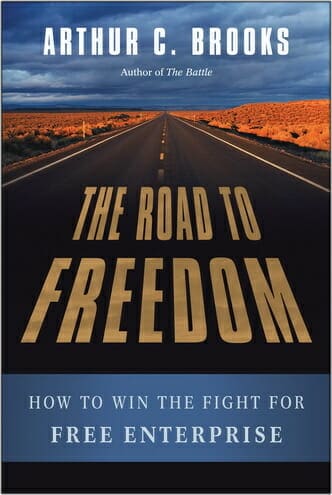This post is connected with another that is similar in it’s point.
“Of all tyrannies, a tyranny exercised for the good of its victims may be the most oppressive. It may be better to live under robber barons than under omnipotent moral busybodies. The robber baron’s cruelty may sometimes sleep, his cupidity may at some point be satiated; but those who torment us for our own good will torment us without end for they do so with the approval of their own conscience. They may be more likely to go to Heaven yet at the same time likelier to make a Hell of earth. Their very kindness stings with intolerable insult. To be ‘cured’ against one’s will and cured of states which we may not regard as disease is to be put on a level of those who have not yet reached the age of reason or those who never will; to be classed with infants, imbeciles, and domestic animals.” ~ C.S. Lewis
A portion by Arthur Brooks via The Wall Street Journal:
…Conservatives are fighting a losing battle of moral arithmetic. They hand an argument with virtually 100% public support—care for the vulnerable—to progressives, and focus instead on materialistic concerns and minority moral viewpoints.
The irony is maddening. America’s poor people have been saddled with generations of disastrous progressive policy results, from welfare-induced dependency to failing schools that continue to trap millions of children.
Meanwhile, the record of free enterprise in improving the lives of the poor both here and abroad is spectacular. According to Columbia University economist Xavier Sala-i-Martin, the percentage of people in the world living on a dollar a day or less—a traditional poverty measure—has fallen by 80% since 1970. This is the greatest antipoverty achievement in world history. That achievement is not the result of philanthropy or foreign aid. It occurred because billions of souls have been able to pull themselves out of poverty thanks to global free trade, property rights, the rule of law and entrepreneurship.
The left talks a big game about helping the bottom half, but its policies are gradually ruining the economy, which will have catastrophic results once the safety net is no longer affordable. Labyrinthine regulations, punitive taxation and wage distortions destroy the ability to create private-sector jobs. Opportunities for Americans on the bottom to better their station in life are being erased.
Some say the solution for conservatives is either to redouble the attacks on big government per se, or give up and try to build a better welfare state. Neither path is correct. Raging against government debt and tax rates that most Americans don’t pay gets conservatives nowhere, and it will always be an exercise in futility to compete with liberals on government spending and transfers.
Instead, the answer is to make improving the lives of vulnerable people the primary focus of authentically conservative policies. For example, the core problem with out-of-control entitlements is not that they are costly—it is that the impending insolvency of Social Security and Medicare imperils the social safety net for the neediest citizens. Education innovation and school choice are not needed to fight rapacious unions and bureaucrats—too often the most prominent focus of conservative education concerns—but because poor children and their parents deserve better schools.
Defending a healthy culture of family, community and work does not mean imposing an alien “bourgeois” morality on others. It is to recognize what people need to be happy and successful—and what is most missing today in the lives of too many poor people.
A couple recommended resources:
- Money, Greed, and God: Why Capitalism Is the Solution and Not the Problem, by Jay Richards;
- The Virtues of Capitalism: A Moral Case for Free Markets, by Scott Rae and Austin Hill;
- Who Really Cares: The Surprising Truth About Compasionate Conservatism: America’s Charity Divide ~ Who Gives, Who Doesn’t, and Why It Matters, by Arthur Brooks;
- The Poverty of Nations: A Sustainable Solution, by Barry Asmus and Wayne Grudem;
- Think Christianly: Looking at the Intersection of Faith and Culture, by Jonathan Morrow;
- God vs. Socialism, by Joel McDurmon;
- Rendering Unto Caesar: Was Jesus A Socialist? (PDF) by Lawrence W. Reed (Audio Book [free])
Listen to an insightful presentation by Jay Richards at the family Research Council (starts at the 20-second mark): “God, Capitalism, and You.” I also uploaded an interview of Wayne Grudem by Dennis Prager about his book, The Poverty of Nations.
Economics is a moral issue. It is critical for Christians to understand that when it comes to economics, good intentions don’t necessarily translate into good outcomes. This means that it is actually possible to do harm to people while intending good if we adopt bad economic policy. See more here.
What’s the best way to help people stuck in poverty get out of poverty? Arthur Brooks, president of the American Enterprise Institute, shows where conservatives and progressives differ.
Dennis talks Arthur Brooks, professor of public administration at Syracuse University, Who Really Cares: The Surprising Truth about Compassionate Conservatism. (Originally broadcast December 28, 2006)
